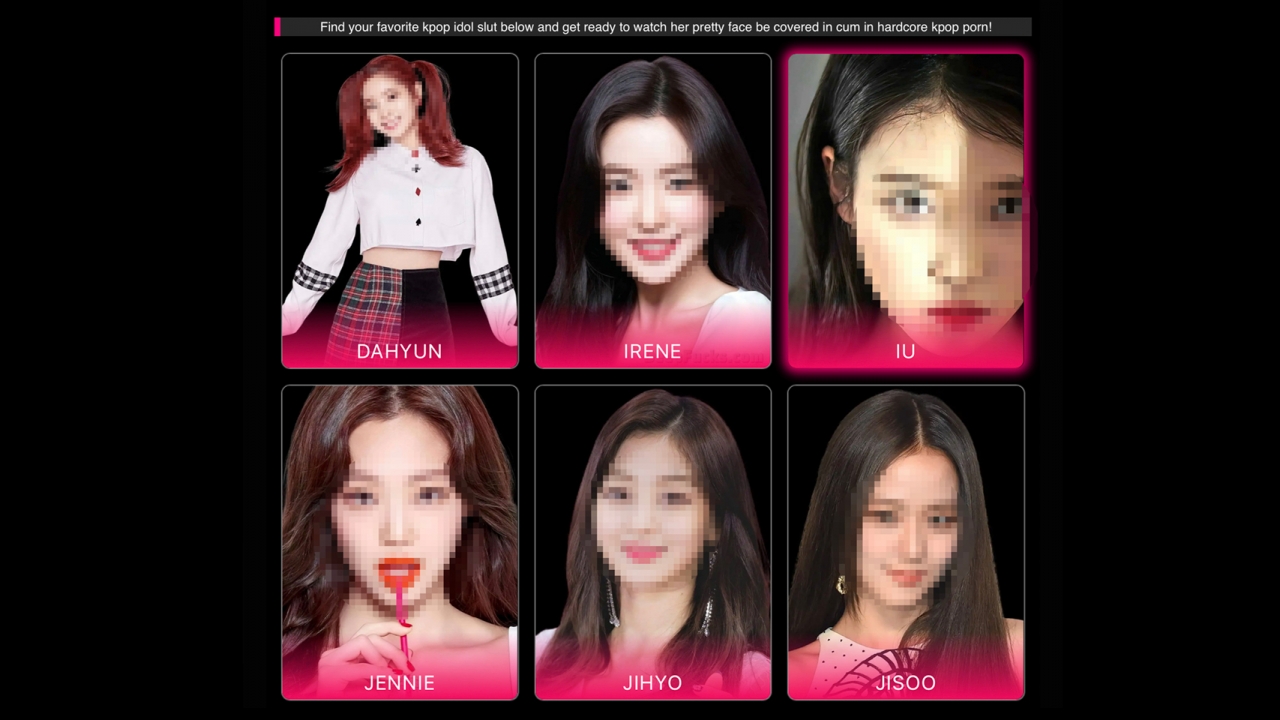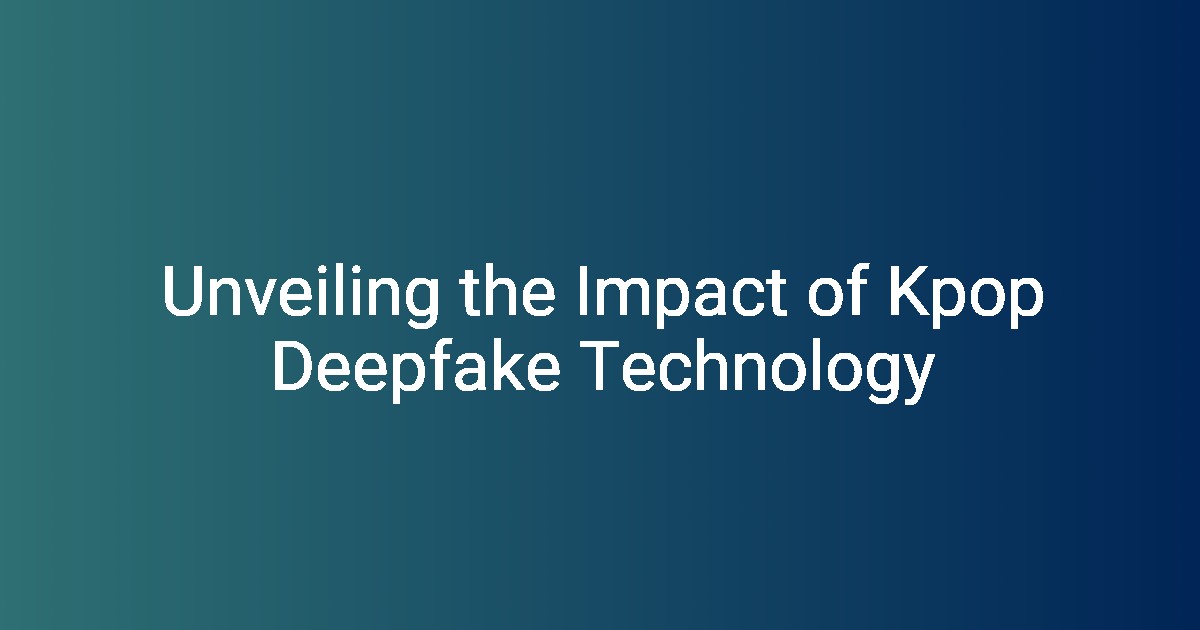Can digital mimicry truly capture the essence of a person, or does it merely distort the truth? The rise of kpopdeepfake is forcing us to confront this question, challenging our understanding of reality, consent, and the very nature of art and entertainment.
The digital frontier, once a playground for novelty, is rapidly transforming into a battleground of perception. Deepfake technology, with its ability to convincingly fabricate visual and audio content, has arrived, and its implications are vast. The K-pop industry, a global behemoth generating billions of dollars annually, has become a prime target, and the ethical considerations are as complex as they are critical. As the technology becomes more accessible, the potential for misuse escalates, casting a long shadow over individuals and the society as a whole. The ethical dilemmas inherent in this digital mimicry are not limited to the music industry, but rather they represent a broader societal challenge.
The core of the issue rests on the manipulation of identity. Deepfakes, by definition, involve the creation of content that appears to be real but is, in fact, fabricated. This raises fundamental questions about consent, autonomy, and the right to control one's own image and voice. Imagine a scenario where an artist's likeness is used without their permission to promote a product or express views they do not endorse. The damage to their reputation, the potential financial losses, and the erosion of trust are just some of the immediate consequences.
- Nipsey Hussle The Legacy Of A Cultural Icon
- Pax Jolie Pitt The Life And Journey Of Angelina Jolies Son
Beyond the individual, the impact extends to the broader public. Deepfakes have the power to sow discord, spread misinformation, and manipulate public opinion. They can be used to create false narratives, damage reputations, and even incite violence. The ability to convincingly fabricate content undermines the credibility of traditional media outlets, making it more difficult for people to distinguish between fact and fiction. The consequences can be severe, eroding trust in institutions and potentially destabilizing societies.
The ethical tightrope walk of kpopdeepfake is a multifaceted problem. It forces us to confront questions of consent, authenticity, and the potential for harm. The rapid advancement of the technology requires a considered approach from the creators and consumers, with the need for a universally accepted set of guidelines for use. The question of consent is paramount. When an individual's likeness is used to create a deepfake, their permission should be sought, and their rights must be protected. Without informed consent, the creation and dissemination of deepfakes constitute a violation of privacy and can inflict significant emotional distress.
However, the ethical considerations extend far beyond simple notions of consent. The authenticity of the content is also at stake. Deepfakes, by their nature, are not real. The ease with which they can be created makes it difficult to verify the authenticity of any visual or audio content. This has profound implications for the legal system, where the ability to present forged evidence could undermine justice. The ability to create deepfakes is growing, and the line between reality and fabrication is growing increasingly blurred. The ability of people to identify genuine content is threatened, as the quality of generated content improves.
- Axel Rose Now The Evolution Of A Rock Legend
- Did Frank Fritz Pass Away On American Pickers A Deep Dive Into His Journey
The potential for harm is another key consideration. Deepfakes can be used to spread misinformation, defame individuals, and incite violence. They can be used to create false narratives, damage reputations, and even incite violence. The consequences can be severe, eroding trust in institutions and potentially destabilizing societies. Consider the case of a K-pop star whose image is used to create a fake sex tape. The emotional distress, the damage to their career, and the potential for harassment are immense. This is a very real threat.
The creation and dissemination of deepfake content inherently raise profound questions about the moral implications. This isn't simply about entertainment; the stakes are far higher. In order to grasp the problem, it's helpful to examine how this technology works.
Deepfake technology utilizes artificial intelligence, particularly deep learning algorithms, to create highly convincing digital imitations. These algorithms are trained on vast amounts of data, such as images and videos of a target individual, allowing them to learn and replicate their facial features, expressions, and even their voice. The process involves several key steps:
- Data Collection: The more data, the better. This includes images, videos, and audio recordings of the target individual.
- Training the AI: The deep learning algorithm analyzes the data, identifying patterns and characteristics of the target's appearance and voice.
- Generation of the Fake: The algorithm then generates the deepfake content, using the learned patterns to create a new video or audio track.
- Refinement: This process is an iterative process, with the generated content often needing further refinement to improve its realism.
The sophistication of the technology is constantly improving, making it increasingly difficult to distinguish between real and fake content. The advancements in the field pose significant challenges to our existing legal and social structures.
The impact of kpopdeepfake extends beyond the individual artists themselves. The music industry, a complex web of labels, management companies, and promoters, faces a new set of challenges. Deepfakes can be used to create fake music videos, generate false controversies, and even manipulate album sales and streaming numbers. The consequences for the industry could be significant, potentially leading to financial losses, damage to brand reputation, and a decline in consumer trust. The emergence of kpopdeepfake requires new regulatory structures and the enforcement of new rules, to prevent misuse.
However, the impact extends far beyond the entertainment industry. The ability to create convincing digital imitations has implications for the legal system, politics, and journalism. Consider the following scenarios:
- Legal System: Deepfakes could be used as evidence in court, potentially leading to wrongful convictions or acquittals. The ability to present forged evidence could undermine justice.
- Politics: Deepfakes could be used to manipulate public opinion, spread misinformation, and damage the reputations of political figures.
- Journalism: Deepfakes could be used to create false news stories, eroding public trust in the media.
The ethical considerations surrounding kpopdeepfake demand careful consideration. While some argue that it is a harmless form of entertainment, it is essential to acknowledge the potential for misuse and the potential harm that can be inflicted. Some of the key ethical issues include:
- Consent: Is the individual's consent obtained before their likeness is used to create a deepfake? Without informed consent, the creation and dissemination of deepfakes constitute a violation of privacy.
- Authenticity: How can we verify the authenticity of the content we consume? Deepfakes blur the lines between reality and fabrication, making it difficult to discern what is real and what is not.
- Potential for Harm: Could the deepfake content cause emotional distress, damage reputation, or incite violence? The potential for harm is a key consideration.
- Misinformation and Manipulation: Deepfakes can be used to spread false information, which can manipulate public opinion and undermine trust in institutions.
- Intellectual Property: Who owns the rights to the deepfake content? The unauthorized use of an individual's image or voice can infringe on their intellectual property rights.
The K-pop industry, known for its fervent fan bases and emphasis on visual presentation, finds itself at a crossroads. The use of deepfake technology presents both opportunities and threats.
Some potential benefits include:
- Creative Exploration: Artists can experiment with new creative avenues.
- Fan Engagement: Interactive experiences for the fans
- Accessibility: It can enhance accessibility for international fans who may not have the opportunity to see their favorite artists in person.
However, the risks are considerable:
- Reputational Damage: A single malicious deepfake can destroy an artist's career.
- Erosion of Trust: The public may become skeptical of all visual media, making it harder to trust artists and brands.
- Legal Complications: Lawsuits related to copyright infringement and privacy violations are on the rise.
- Mental Health Impact: The artist's mental health could be significantly impacted if their persona is compromised in the deepfake.
The use of deepfakes raises pressing questions about the balance between creative freedom and the rights of individuals. Where do we draw the line? How do we create an environment where innovation can thrive while safeguarding against the very real dangers?
The ethical questions raised by kpopdeepfake are at the forefront of discussions surrounding this technology. It is important to use the technology responsibly, and there is an increasing need for a global approach to this issue. This complex issue requires a multi-pronged approach. The artists, fans, the industry, and the tech companies should all participate in the debate and contribute towards the solution.
The path forward requires a collaborative approach: artists, fans, industry stakeholders, and technology developers must work together. One crucial aspect is education. Educating the public about deepfake technology, how it works, and the potential for manipulation is essential. Additionally, the development of tools to detect deepfakes is needed. Technology companies have a responsibility to develop tools and algorithms that can identify and flag deepfake content.
The discussion should also encompass legal frameworks. New laws and regulations are needed to address the creation and dissemination of deepfakes. These laws should address issues such as consent, copyright, and the use of deepfakes for malicious purposes. Furthermore, the music industry should self-regulate. Labels, management companies, and streaming services need to develop clear guidelines and policies regarding deepfake use. This includes protocols for obtaining consent, verifying the authenticity of content, and addressing any ethical concerns. These types of regulations and self-regulation are key to navigating the complex world of kpopdeepfake.
The evolution of deepfake technology forces us to consider how we interact with media and the world around us. The technology raises questions about the very essence of reality, as the lines continue to blur.
The potential consequences of this technology are widespread. We can delve into the ways this digital phenomenon affects our lives and the entertainment industries we consume. From understanding the basics of what deepfakes are and how they differ from their less sophisticated counterparts, \u2018cheapfakes,\u2019 to exploring their surprising absence in hollywood, this exploration covers it all.
The ethical implications of kpopdeepfake are far-reaching and represent a challenge to our society. This technology has become more accessible, so we must use it responsibly. As the technology continues to evolve, the need for a thorough understanding of the ethical considerations surrounding its use will only increase. By doing so, we will pave the way for a future where creative expression and technological advancement coexist harmoniously.
It's easy to get caught up in the spectacle of the technology, but it's important to be aware of the ethical concerns associated with this technology and to use it responsibly. In this article, we delve into the intricacies of kpopdeepfake, examining its impact on the industry, its potential risks, and the ongoing debate surrounding its use. The technological marvels that fuel its existence are constantly changing.
Deepfake technology has gained notoriety for its ability to create highly convincing digital imitations of real people, often blurring the lines between reality and fantasy. We delve into the fascinating world of kpopdeepfake and its ethical implications. With the rapid advancement of deepfake technology, the line between reality and fabrication is becoming increasingly blurred. This article delves into the intricacies of kpopdeepfake, exploring its impact, ethical considerations, and the technological marvels that fuel its existence.
- Frankie Muniz Has 17 Kids A Deep Dive Into His Family Life
- Exploring The Life Of Jim Carreys Daughter Jane Carrey


